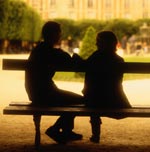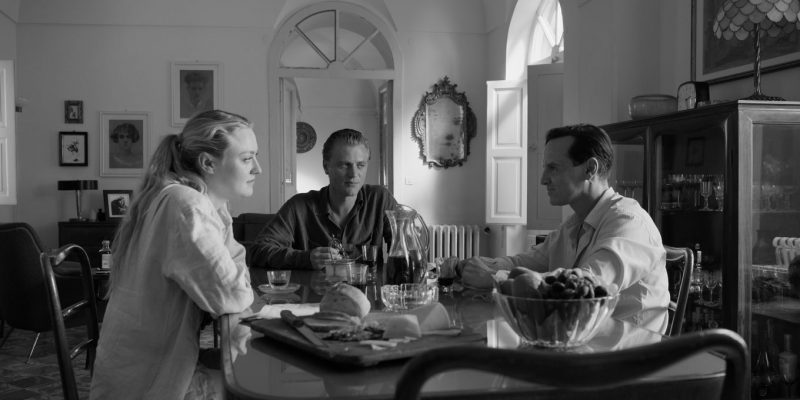Culture
Home alone
You love your husband, but some days you wish he weren't around. This fantasy? More common than you think.
by : Lise Gabriele- Aug 5th, 2005

Your husband calls to say he’ll be home soon, but the clock is ticking and ticking. Waiting for him — your life on hold — you suddenly have an image of yourself in black, veiled like Jacqueline Bouvier Kennedy (or the even richer Jacqueline Bouvier Kennedy Onassis). For you, widowhood means being alone but not lonely — it’s a fantasy infused with philosophical what-ifs about renewed independence. For if widows can be divided into two classes — the bereaved and the relieved, as medical historian Victor Robinson once said — then the same can be said for widow fantasies.
Let’s be clear — this is not about the morbid, four a.m. musings that the unhappily married may have when they can’t see a dignified way out of a dead-end relationship. And this is a world away from Barbara Stanwyck’s scheming adulteress in Billy Wilder’s classic film noir Double Indemnity (1944) or Theresa Russell’s serial spouse dispatcher in Black Widow (1987).
This is about happily married women in love with their husbands who daydream — at one time or another — of having a decent block of time away from the demands of their loved ones. The Everywoman — overworked and overwhelmed — wants to reclaim her life and have the time and energy to enjoy it. When you look at the stats, you can see why. The last Census of Canada, in 2001, found that 21 percent of Canadian women spent at least 30 hours a week doing housework, compared to eight percent of their husbands, a number unchanged since 1996. And that’s often after a hard day at the office. The same is true for child care: 16 percent of the women polled claimed to spend about 30 hours a week with their children. As for the guys, about seven percent said they diapered, bathed and fed the kids.
“Women feel a lot of anxiety over these widow fantasies,” says Linda Perlis, a Toronto social worker and psychotherapist. “There’s the guilt over anticipating a situation you’re not really in. But these kinds of fantasies are common in women who find themselves feeling that what they have is not exactly what they want. It has nothing to do with the husband’s actual death, rather with a woman picturing herself as a survivor.”
For Denise, a mother of two young children in Toronto, her own widow fantasy is not about her marriage, which is a very happy one. And she wouldn’t want to be coping alone while her children are young. Her widow fantasies are about the independence she’d experience later in life. “I’d have a little house just big enough for me,” says Denise. “Maybe I’d run a little shop or restaurant. I’d chop my own wood and own a pickup truck. I spend much of the time fantasizing about how I would decorate.”
A hundred years ago, widowhood was a desperate existence — certainly nothing to wish for. Its depiction in 19th- and 20th-century literature is of lonely women, teetering on penury, sexually shunned and turned embittered and anxious. Think of the vicious stepmother in Snow White competing with her young stepdaughter both sexually and financially. Or Aunt Norris in Jane Austen’s Mansfield Park. Left with little after the death of her husband, Aunt Norris’ meddling and manipulations are actually due to the sudden social and financial precariousness of widowhood. These days, women are more self-sufficient and financially independent, and the idea of widowhood is less fraught with monetary terror — although the haunted faces of the 9/11 widows are a grim reminder of real-life bereavement.Widow fantasies are fuelled by celebrated images of widow icons like Jacqueline Kennedy descending the steps of the Capitol clutching Caroline and John-John’s tiny hands. Even after her husband’s sexual dalliances were posthumously made public, it only reaffirmed her status as the noble stoic that women imagine themselves to be in their own widow fantasies. In fact, the sombre
dignity both Kennedy and Yoko Ono displayed after the murders of their husbands has lent a weird sort of glamour to modern widowhood. Even Donna Karan and Katie Couric were elevated in the eyes of the public after their husbands passed away.
Respect for the dignified widow is precisely what American political columnist Charles R. Smith was talking about last fall when he wrote that Hillary Clinton would have no trouble winning the White House if Bill Clinton “were pushing up daisies.” Voters, he suggested, would readily relate to a woman forced to cope with sudden tragedy than to a woman who chose to stay in a humiliating marriage with a careless man.
Michael Godkewitsch, a Toronto psychologist, agrees that daydreaming about widowhood is normal, but he warns that craving attention or pity should make you
contemplate what you may be missing in life. “If you start to realize that you’d rather be alone, maybe you need couples counselling. Or maybe, in the end, you need to take steps to leave the partnership.”
But what happens after the imaginary funeral, the loving eulogy, the tasteful burial? Most women interviewed had only vague thoughts of being with other men. And none imagined remarrying. “I wouldn’t want another relationship if my husband died — just lots of liaisons,” says Vivien, 40, an author from St. John’s, Nfld. “I see myself sitting there in the candlelight, all dressed up, trying to be vivacious and really intelligent and funny … I can imagine myself coming through an apartment door alone, feeling utterly content. But whose point of view am I imagining myself from? Who is seeing me in these settings? Sometimes it feels like it’s my husband.”
Newsletter
Join our mailing list for the latest and biggest in fashion trends, beauty, culture and celebrity.
Read Next

Fashion
This Canadian Swimwear Brand Designed Canada’s 2024 Women’s Olympic Beach Volleyball Team Uniforms
And they're *so* good.
by : Allie Turner- Apr 24th, 2024
Fashion
The Most Iconic Looks In Met Gala History, From 1973 To Now
40 years of the night that's all about trailblazing fashion.
by : ELLE Australia- Apr 24th, 2024

Culture
This University Elevates Women to New Professional Heights
You shouldn’t have to pause your life to move forward in your career.
by : ELLE Canada- Apr 16th, 2024




